We are taught so many things about gardening before we ever begin.
Commercially, gardens are described as a piece of ground – a thing to be used, made to do what we want. They should be nice to look at, and produce flowers or food, a lawn…another collection of “stuff”. It means cultivating, or breaking up soil, then deciding what gets to live in that garden and what does not. Everything very orderly. This way of gardening has its place, but it must be understood for what it is – an extension of indoor living. It can have lighting, furniture, and even a soft green carpet. What a nice safe place for a human to be.
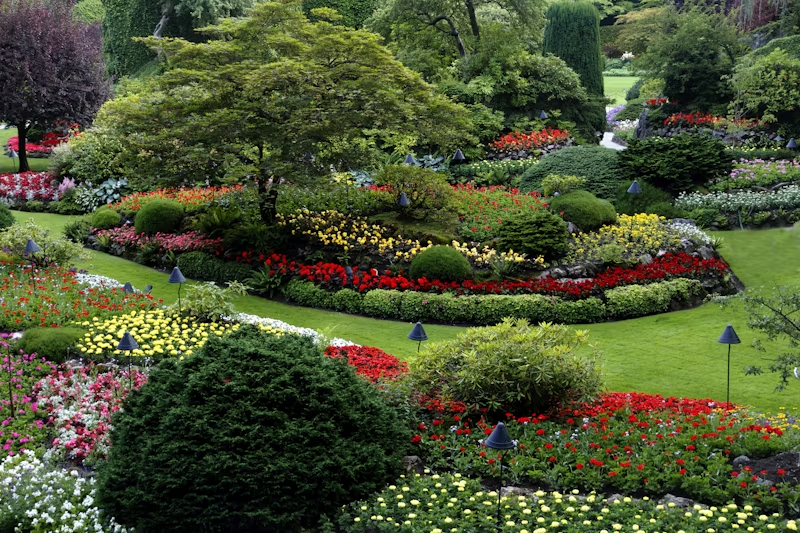
Photo by Jan Canty on Unsplash
I can appreciate the sheer work and talent required to create and maintain this type of garden. (Certainly, more time and energy than I have!) But this doesn’t need to be a barrier.
Limiting ourselves to a plastic mechanistic way of thinking about gardens erases an opportunity to understand living ecosystems.
The source of life is outside and too many people stay shut inside, hiding away from it in fear and disgust. When the temperature outside matches that of the indoor shut-in life they venture outside, kill the bugs, kill the weeds, kill the quiet with gas-powered tools, kill the air with grill vapors, smoke, and exhaust, and call it “outdoor living” without any regard for what is actually living outdoors. A growing number of us are getting concerned about the impact of all of this on our health and the environment.
I thought I was ahead of this game. I grew up with a deep appreciation of ecosystems and a close relationship to nature. I assumed I had a basic understanding of organic gardening and vegetable beds and how they work. As with everything, there is no replacement for experience. I was swiftly humbled and totally amazed.
I had to re-school the gardener.
I wanted to grow food with as little time, money and energy as possible. Pesticides? Too expensive, too much effort to apply. Lawns? Too much work, I hate mowing! Weeding? Ugh! No thank you. How about growing things in pots? I’ve done that, it was familiar ground, so that’s where I started. An astonishing amount of food resulted and I didn’t understand why. I started researching, and down the rabbit hole I went.
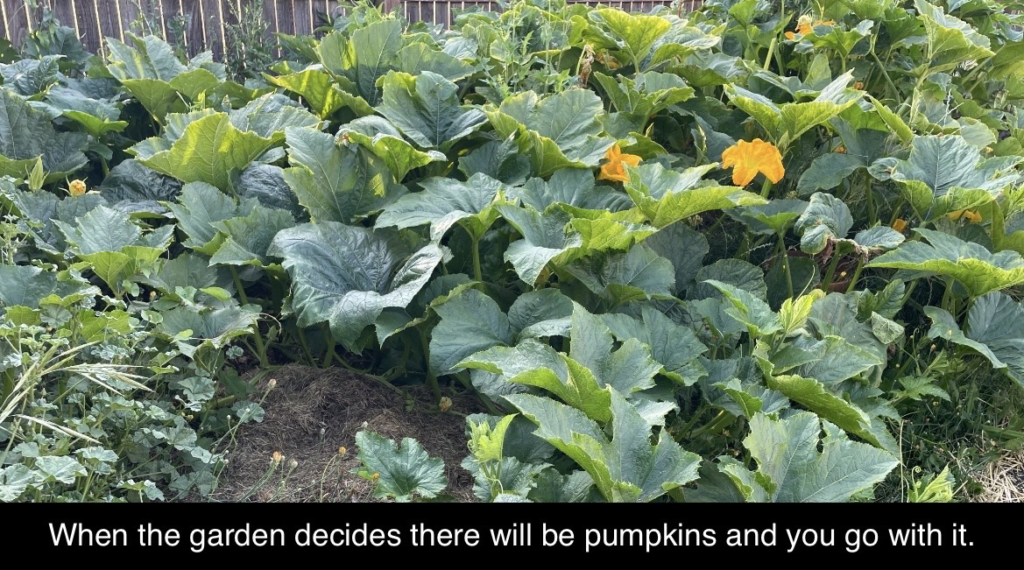
By next season I had stumbled upon the world of no-till natural gardening and was instantly hooked and eager to try it. I went from brown thumb to garden addict, my hands full of isopods and worms, trying to spread my enthusiasm for regenerative garden ecosystems to anyone who would listen and get over the “ick” factor. My garden became a riot of green chaos, with giant sunflowers towering over it all and swarms of more bug species than I could track.
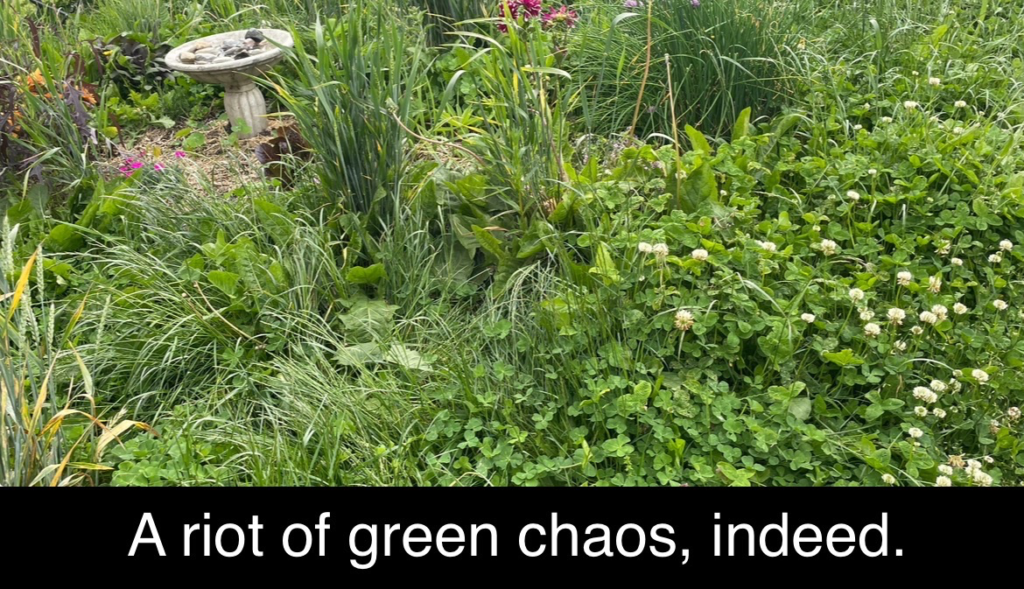
Everyone wanted to know how I had such crazy beginner’s luck and I had no answers. I was giddy and a little obsessed. This year I’m even more giddy. I’ve doubled the number of vegetable beds and I have no idea what I’ve gotten myself into.
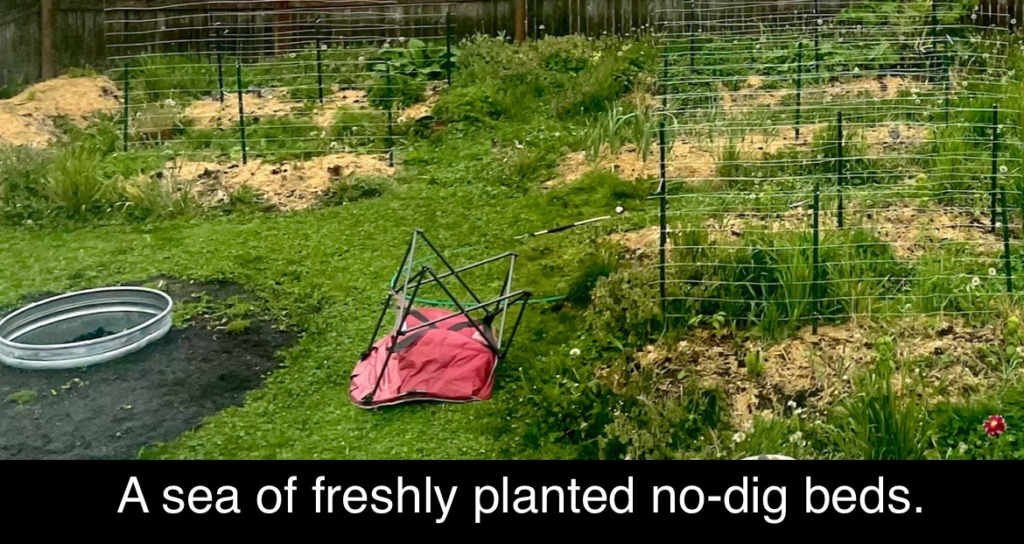
Re-schooling the gardener is a shift to system thinking.
It’s a growing understanding of how all of the living and non-living pieces of this ecosystem interact and affect each other. It means doing what the garden tells me, instead of blind adherence to a “watering schedule” or instructions on a box. There is no recipe to gardening. Just like interacting with other people it is a step by step reciprocal process requiring not just knowledge and keen observation, but also wisdom.
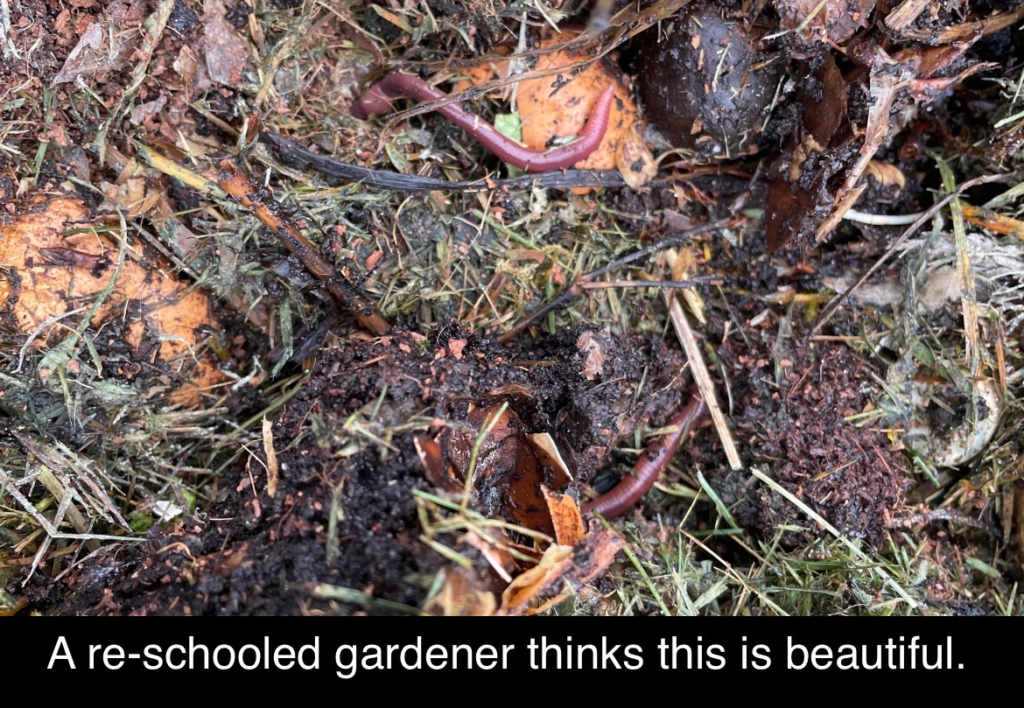
The garden is no more just a location full of “stuff” and non sentient living things, but a sophisticated, incomprehensibly complex, dynamic “entity” with whom I communicate and interact. Just as the individual living cells and microorganisms combine to make a single living thing, these elements combine to make a single (and yet not separate) ecosystem where everything is connected. A fascinating reflection of our existence! What a trip.
One thing is at the core of my re-schooling as a gardener:
I try to interact with my garden every single day.
Gardening this way is not an indoor sport. Even if the weather is “yucky”, or I’m tired, I grab my floppy hat, scuffed-up boots, and just go out there without an agenda. Whatever the weather, I try to go out, if even for a few minutes. Puttering by each vegetable bed, it’s clear who is thirsty, who is getting munched by wildlife, and who has just made their first bloom. I bring the gift of my time, energy, maybe some scraps for the compost. Sometimes this takes a few minutes, other times hours go by while working out there, doing whatever is needed. Fatigue never seems to find me out there until I’m pushed to the point of total exhaustion. Mental and emotional health improves as well – anxiety, depression, frustrations, all seem to dissolve like magic. Being indoors seems very dead by comparison.
When something is a mystery I research it. Whether identifying what volunteer plants can tell me about the soil or determining what pest or disease or deficiency a plant is struggling with, (not to mention identifying and understanding the role of bugs and other wildlife!) the knowledge base grows slowly bit by bit along with my plants. What a privilege to be living in the information age!
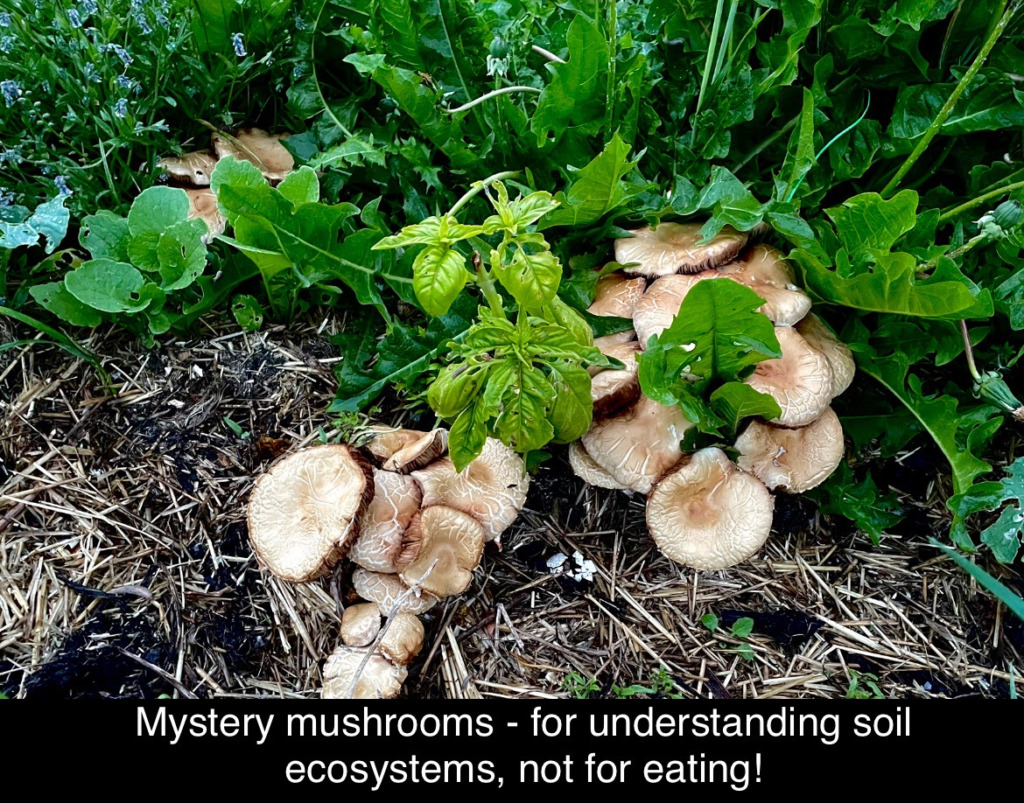
The garden is a generous place.
Besides the benefits to my health, gifts are freely given to me every time I go out there. It may be a harvest. It may be something interesting or beautiful to see. It may be a lesson. There is always some reward for my time and energy. I try to eat something from the garden every day if I can, either fresh from it or something that was stored to eat later. But even if there is no harvest, just enjoying my garden is enough.
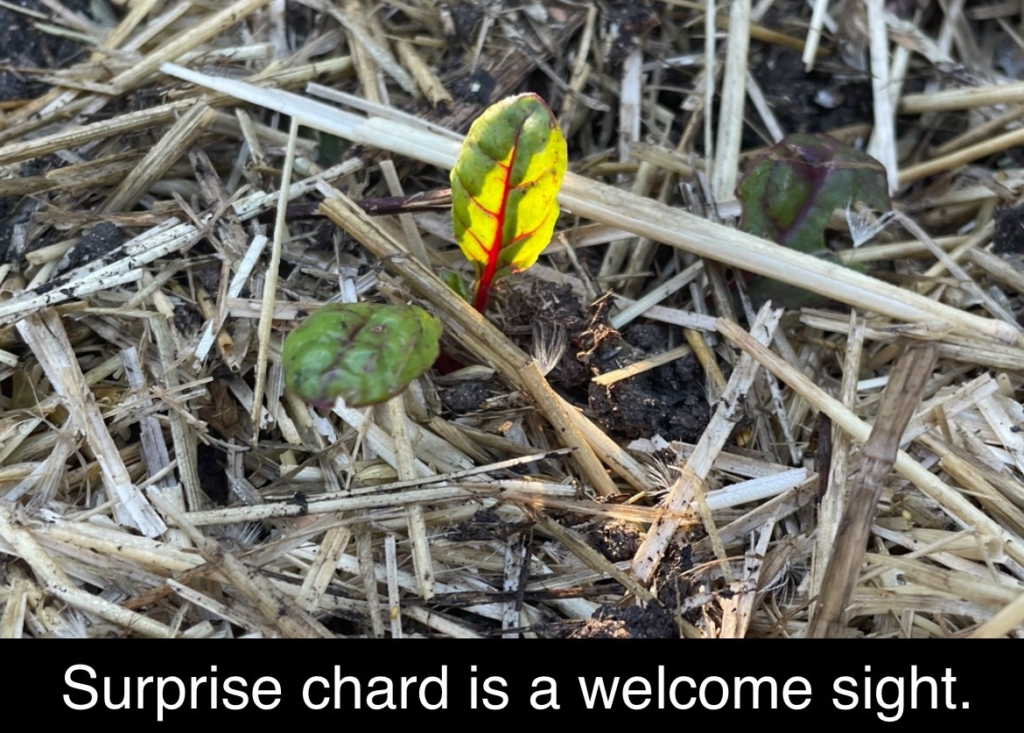
I can’t stress enough how much I yearn for everyone to grow food with whatever resources they have available, even if you just grow some sprouts in a jar! Don’t worry if you don’t know how to begin – the internet will show you, and Nature will teach you the rest.
Get growing! Re-School is in session.
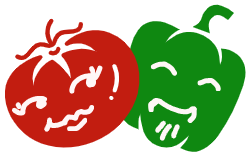
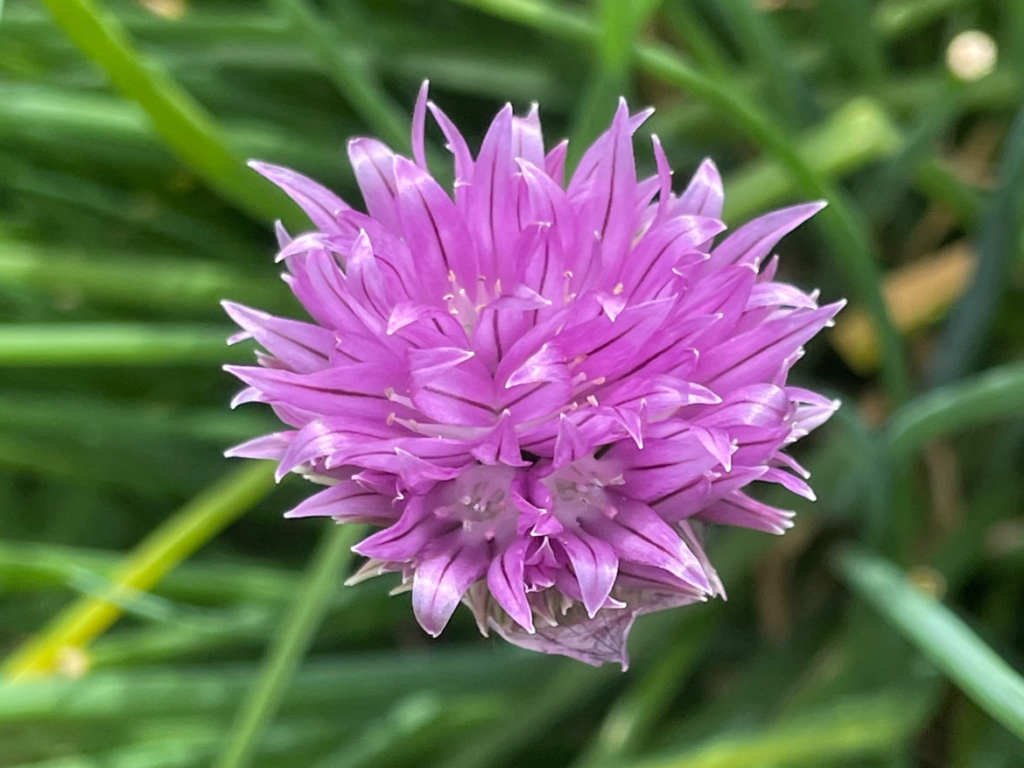
LOVE YOUR WEBSITE!
Your insights and photos are full of the wonder of our natural world.
I can “feel” that little chard breaking through to the sunlight.
I think that’s why gardening is so good for our mental health; it’s a continuous exposure to experience of “wonder” and our delight in that experience.
Great job, you should write a book.
Thank you! I hope to continue developing my writing skills and will definitely publish books at some point!
I want to frolic in your garden 😂
Fully agree. Gardening is so much more than the weather chart on the back of the seed packet. I just recently listened to a podcast about paying attention to the leaves and what they mean. Food for thought, pun intended.
Awesome!
Thank you!